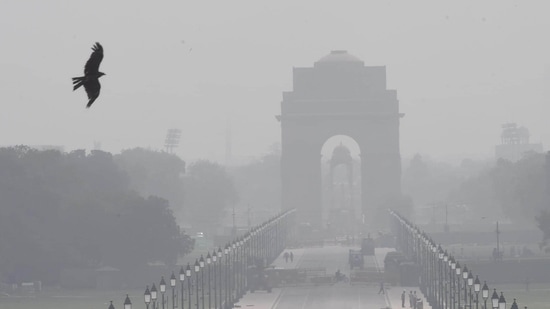Explainer: The CAQM's powers in the enforcement of the new GRAP
The revamped Graded Response Action Plan is binding on the NCR and adjoining areas and gives the Commission for Air Quality Management the power to take action against violators.
New Delhi: The Commission for Air Quality Management (CAQM) is legally authorised to enforce the revamped Graded Response Action Plan (Grap) to combat air pollution in Delhi NCR, which includes measures such as prohibiting diesel vehicles not conforming to BS-VI from plying if the Air Quality Index (AQI) reading rises above 450 and halting construction work if the AQI reading crosses 400, without needing to notify it first, senior Union environment ministry officials said.

“The revamped Grap doesn’t need to be notified because the CAQM has powers to issue directions and create an air pollution control programme for NCR and its neighbouring northwestern states. Therefore, CAQM’s directions will have to be enforced by state governments. They have already been consulted on these interventions,” a senior official of the environment ministry said. CAQM had on Monday released a comprehensive policy on air pollution for Delhi-NCR, which includes a revised Grap, among other short-term, medium-term and long-term measures.
A CAQM official also said there was no need for a notification, since states can take action now that the policy has been released and shared with them.
“There is no need for a notification. CAQM has powers to prepare programmes and regulations and if these are violated we can take action against any violator, individual or government. We will soon issue advertisements and directions to implement the revised Grap. Grap was already notified under the Environment Protection Act,” said a member of CAQM.
Under the Commission for Air Quality Management in National Capital Region and Adjoining Areas Act, 2021 which was passed on August 12, 2021, the Commission has the power to take all measures, issue directions and entertain complaints it deems necessary or expedient for the purpose of protecting and improving the quality of the air in the National Capital Region and adjoining areas.
Ritwick Dutta, an environmental lawyer and founder of the Legal Initiative for Forest and Environment (LIFE), said CAQM could enforce the new Grap without notification as it was a statutory body, but in India, most interventions did not work because of the failure of regulatory agencies.
“Till now, CAQM did not technically initiate any action and only made directions. So, we are not sure if they will take direct legal action when their directions are violated. The second issue is if will CAQM acts against pollution control boards, which are also regulatory bodies, if they don’t enforce the norms?” he said.
“When the Environment Pollution Control Authority was enforcing the Grap, they did not act against regulatory agencies for non-enforcement. Also, there is no timeline for the enforcement of these measures. That will be critical to ensure states comply,” he added.
The Commission’s duties include taking measures to abate air pollution and to regulate or prohibit activities that are likely to cause or increase air pollution in NCR and adjoining areas, such as coordination of action with the governments of Delhi, Punjab, Haryana, Rajasthan and Uttar Pradesh, their officers and other authorities; planning and executing programmes for the prevention, control and abatement of air pollution in the region; laying down parameters for the quality of air; laying down parameters for emission or discharge of environmental pollutants from various sources that impact air quality in the region.
The Commission can also issue directions — for the closure, prohibition or regulation of any industry, operation or process; or stoppage of electricity or water supply or any other service — in writing to any person, officer or any authority, who are then bound to comply with such directions. Any non-compliance or contravention of any provisions of the Act and rules made thereunder or any order or direction issued by the Commission, shall be an offence punishable with imprisonment for a term which may extend up to five years or with a fine which may extend up to ₹1 crore or with both: These penal provisions, however, will not apply to any farmer causing air pollution by stubble burning or mismanagement of agricultural residue.
The Commission at present has exclusive jurisdiction in the National Capital Region and Adjoining Areas i.e. states of Haryana, Punjab, Rajasthan and Uttar Pradesh and Delhi, officials said.
Unlike the previous Grap, the new Grap will now take into account the index of air pollution, which reflects the concentration of several pollutants — particulate matter (PM) 10, PM2. 5, Ozone (O3), Sulphur dioxide (SO2), nitrogen dioxide (NO2), carbon monoxide (CO), lead (Pb) and ammonia (NH3) — and not just PM2.5 and PM10 as triggers for the curbs. More importantly, the imposition of restrictions under the three most serious levels will be pre-emptive instead of after pollution levels have spiked which comprises eight different pollutants Under the new plan, stage I is when the AQI is in the “poor” range (between 201 and 300), stage II when it is in “very poor” (between 301 and 400), stage III when it is “severe” (between 401 and 450), and stage IV when the AQI is in “severe plus” (above 450).
The Delhi government did not comment on its preparedness to implement the newly revamped GRAP.
Sunil Dahiya an analyst at the Centre for Research on Energy and Clean Air said while it is a positive move to make pro-active this time instead of reactive, not including power plants under GRAP or including any kind of penalty mechanism for them was an aspect the policymakers missed. “This would have made it more comprehensive as even GRAP needs to target all sectors,” he said.
Continue reading with HT Premium Subscription




